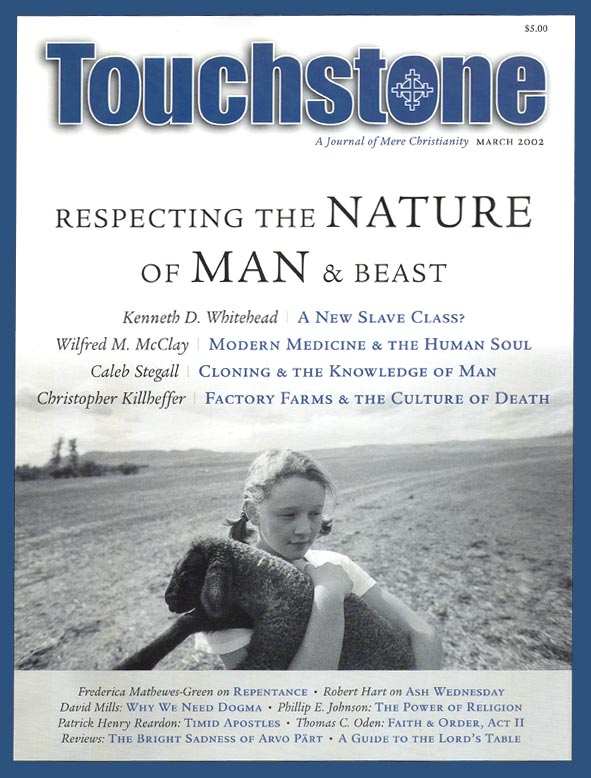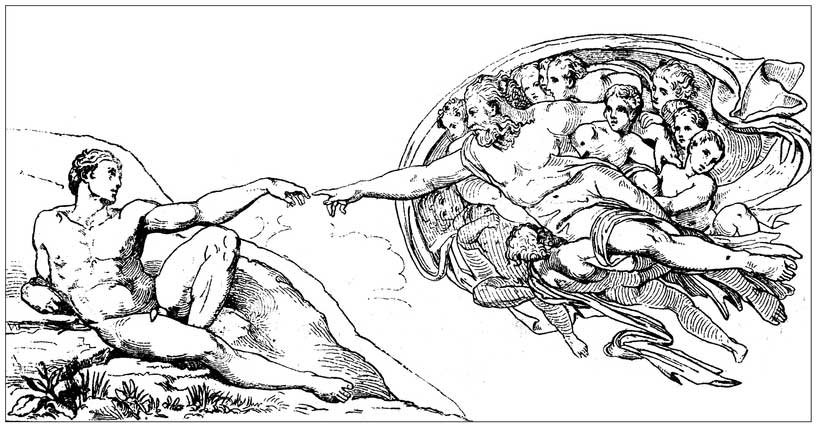Introduction
In 2018, First Things editor Rusty Reno wrote a piece where he argued that "our American culture of freedom requires solidarity" and our task, Reno wrote, "is to promote the politics of the common good." Common Good Conservatism, as Reno called it, could be framed around traditional marriage, sensible regulation, and support for the religious character of the American people.
The problem with "common good conservatism" is that there is no agreement on either what is common or good (or even conservative). And calling it that doesn't make it so. In the 1930s, for example, the socialist and atheist reformer John Dewey signed the Humanist Manifesto, which also declared a commitment to "the common good."
Christianity, on the other hand, makes some uncommonly specific, elaborate, and historical claims that there's no getting around, and the contemporary habit of downplaying such specificity in the name of common ground is a bad idea, or so argues David Mills in his 2002 article for Touchstone, Necessary Doctrine.
—Douglas Johnson, Executive Editor
(read more Editor's Picks)
Necessary Doctrine by David Mills
Feature
Necessary Doctrine
Why Dogma Is Needed & Why Substitutes Fail
by David Mills
Many perfectly serious Christians hate, just hate, to be thought “dogmatic.”
You know the sort of man I mean. He will end a discussion of first principles
by earnestly reassuring everyone with whom he has been arguing of his deep respect
for all those who disagree with him, with an eagerness that suggests not so
much a respect for differences as a fear that others may think him too sure
of his position.
I have heard some very conservative Christians end such a discussion—of
first principles, mind you—by declaring that all views on the subject
are of equal value and then looking all around with the perky smile of someone
who expects to be praised. I once heard a man finish explaining the inescapable
necessity of believing in the divinity of Christ with the sentence, “Of
course, this is only my opinion.” If I remember rightly, I could hear
a sigh of relief from the others.
What Makes Them Nervous
It is the specifically Christian doctrines that upset this sort of Christian.
Such Christians are themselves on many other matters very dogmatic: They believe
that eating ground glass is stupid, that you should not run in front of moving
trucks, and that hitting babies is wicked. They believe these, the last especially,
to be eternal and unchangeable truths and will say so in public.
But for some reason they do not like to say in public anything exclusively Christian.
Like those who boast of their belief in the authority of Scripture but are so
afraid of being thought “fundamentalist” or “literalist”
that they rarely quote a word from the Bible, these Christians (who are often
the same people) believe in a gracious God who loves mankind, but they do not
want even to talk about how that grace is given to men, or who exactly is the
Jesus who gives it, or how he is related to the Father and the Spirit, or (especially
to be avoided) how those who have received God’s grace are supposed to
live, or (even more to be avoided) what actions will separate us from that grace,
or (most to be avoided) why he is the only Savior of mankind and the others
imposters.
They like their doctrines “filed by title,” with the content left
unspecified. They like to talk about “the Incarnation,” but are
less comfortable saying “He was made man,” because that implies
“He, and no other, was made man” and “He, and not Allah, or
Buddha, or any of the Hindu pantheon, was made man,” and these imply “I,
though an unworthy sinner, know the truth, and you don’t.”
As I said, it is Christian doctrine that quiets their voices, lowers their eyes,
removes the conviction from their faces, and drives them to find some alternative
to saying out loud the stark and inevitably divisive words of the Christian
doctrines. They may well believe them, but they do not like to speak as if they
do. It would be useful to reflect on why they do this, but in this essay I want
instead to explain why their usual alternatives to doctrinal conviction do not
work.
When they explain their objection to doctrine, they usually insist that a concern
with right doctrine destroys both the unity of the Church and (sometimes or)
her ability to serve the world. They will point to the obvious faith of other
Christians and say that they do not want to be parted from them by a mere difference
in a few words, and they will declare that the world’s needs are far too
great to spend time disputing a few abstract ideas.
At the same time, and as a sort of theological support for this rejection of
theology, these people usually suggest that believers need a more immediate
and fluid relation to God, uninhibited by doctrinal restrictions. On the liberal
side, the former Episcopal bishop of Newark once said in his helpfully straightforward
way—he at least never minded being thought dogmatic—that doctrines
are merely “images that bind and blind us all.” On the conservative
side various charismatic leaders have been fond of saying that “theology
divides, but experience unites,” and of dismissing a theological argument
as “a mind game.”
Both treat holding to dogma as something that less enlightened people do. Dogma
is for the spiritual and moral dullards, people who do not have the vision of
the liberal or the revelation of the charismatic. People who cannot let go of
the past hold to the doctrines.
Continue Reading
David Mills has been editor of Touchstone and executive editor of First Things. He edits the opinion page of the Pittsburgh Post-Gazette.
Order
Print/Online Subscription

Get six issues (one year) of Touchstone PLUS
full online access including pdf downloads for only $39.95. That's only $3.34 per month!
Order
Online Only
Subscription

Get a one-year full-access subscription to the Touchstone
online archives for only $19.95. That's only $1.66 per month!
Order Touchstone subscriptions in bulk and save $10 per sub! Each subscription includes 6 issues of Touchstone plus full online access to touchstonemag.com—including archives, videos, and pdf downloads of recent issues for only $29.95 each! Great for churches or study groups.
Transactions will be processed on a secure server.

18.10—December 2005
A Mighty Child
on an Apostle’s Encounter with
the Son’s Children by Anthony Esolen
more from the online archives
calling all readers
Please Donate
"There are magazines worth reading but few worth saving . . . Touchstone is just such a magazine."
—Alice von Hildebrand
"Here we do not concede one square millimeter of territory to falsehood, folly, contemporary sentimentality, or fashion. We speak the truth, and let God be our judge. . . . Touchstone is the one committedly Christian conservative journal."
—Anthony Esolen, Touchstone senior editor
Support Touchstone
00















